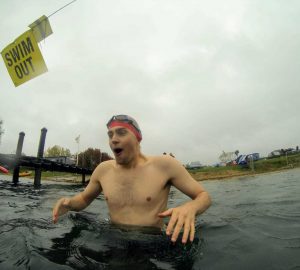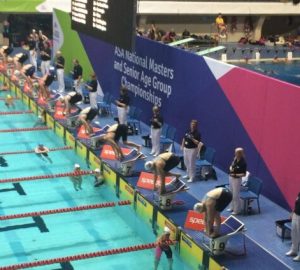The advantages of not having been an international swimmer
Last weekend swimming legend Grant Hackett took part in the Australian nationals in Sydney. He’s 34 and it was his first major competition since retiring from swimming after the Beijing Olympics in 2008. He returned to training six months ago after a six-year break, and then went on to finish third in the 400m freestyle and fourth in the 200m, thereby earning himself a slot on the Australian team at the world championships.
Grant was and is an exceptional swimmer but we’ve probably all come across people who competed nationally or internationally as youngsters, gave it up for 10 or 20 years, yet within a few months of turning to masters swimming are leading the fast lane.
As swimming is so skills based, people who start as adults have a huge disadvantage when it comes to speed. Learning to swim fast takes thousands of hours of practice – and once you have a job, a social life and a family it can be hard to find three spare hours a week for training, let alone the three to four hours a day that top swimmers spend in the water. However, if you have done that training as a teenager, it’s like having a generous sum of money in the bank that you can draw on throughout your life.
This can make swimming frustrating for people who start as adults. Even if they swim many times each week they will struggle to keep pace with the once-per-week swimmer with childhood experience. It’s simply very hard to accumulate the necessary hours of purposeful training if you haven’t done it as a youngster – much as it’s harder to learn a language or a musical instrument as an adult.
However, it’s not all bad news for late starters. Coaches will tell you that working with non-swimmers is like starting a painting with a blank canvas and they can begin practising good up-to-date technique from the first lesson. Childhood swimmers in contrast will have ingrained their habits, both good and bad, learnt through thousands of repetitions, and often find it extremely difficult to make changes. They also often think they know what they’re doing and are therefore less willing to make changes – especially if those changes might initially cause them to slow down. However, thinking on best technique has evolved considerably over the past 20 years and there are almost certainly things they could learn to help them go even faster.
In addition, youth swimming, mostly, is about sprinting. The majority of people who swam as kids will have trained for 50m, 100m and 200m events. Their strokes, physiology and mentality will have been refined for maximum power over very short distances. Long distances (3km and above) – and especially open water – are really intimidating to these swimmers and so they often give up without even starting. People who take up the sport as adults, in contrast, don’t have these pre-conceptions and can learn a more efficient style of swimming suited to long distances from the beginning. As mentioned previously, adult starters often have fewer hang-ups about swimming outside. Open water can therefore be a great leveller.
Next, adult starters can look forward to years of improving and posting ever faster times: something that’s denied youth swimmers, who will almost always have set their benchmark swim times in their late teens or early 20s. From then on, it’s just decline. In his comeback swim last weekend, Grant Hackett swam a staggeringly fast 1:46.84 for 200m freestyle. However, his career best is 1:45.61. It will be really hard for him to reach that speed again. On the other hand, someone taking up swimming later in life doesn’t have these youthful performances to compare with and get depressed about.
Finally, it’s always worth remembering that being a “good” swimmer is not synonymous with being a “fast” swimmer: endurance, cold water tolerance, ability to deal with rough water and sense of adventure are all part of the package. Youth swimming may even dull the abilities in some of these areas.
Another wonderful thing about swimming is that it doesn’t seem to matter when you start. I have spoken to people in their 70s who have taken up swimming and been able to make significant improvements. There was a story on the BBC this week about a Japanese woman who took up swimming at 82 and now holds multiple world records in the 100 to 104 year age group.
So, don’t be envious of people who swim fast now because of the training they did as a teenager. Remember instead all the other “normal” teenage things you were doing while they were counting tiles, and be satisfied that while you’re still improving, they are most likely getting slower.
Image: Grant Hackett on the comeback trail © Swimming Australia







